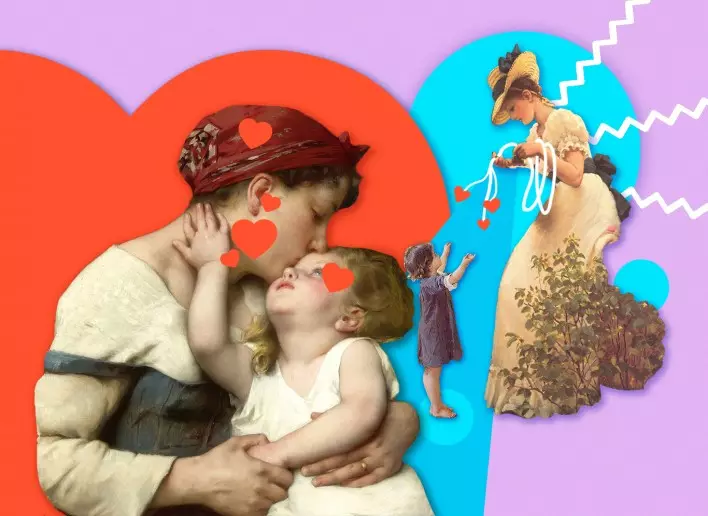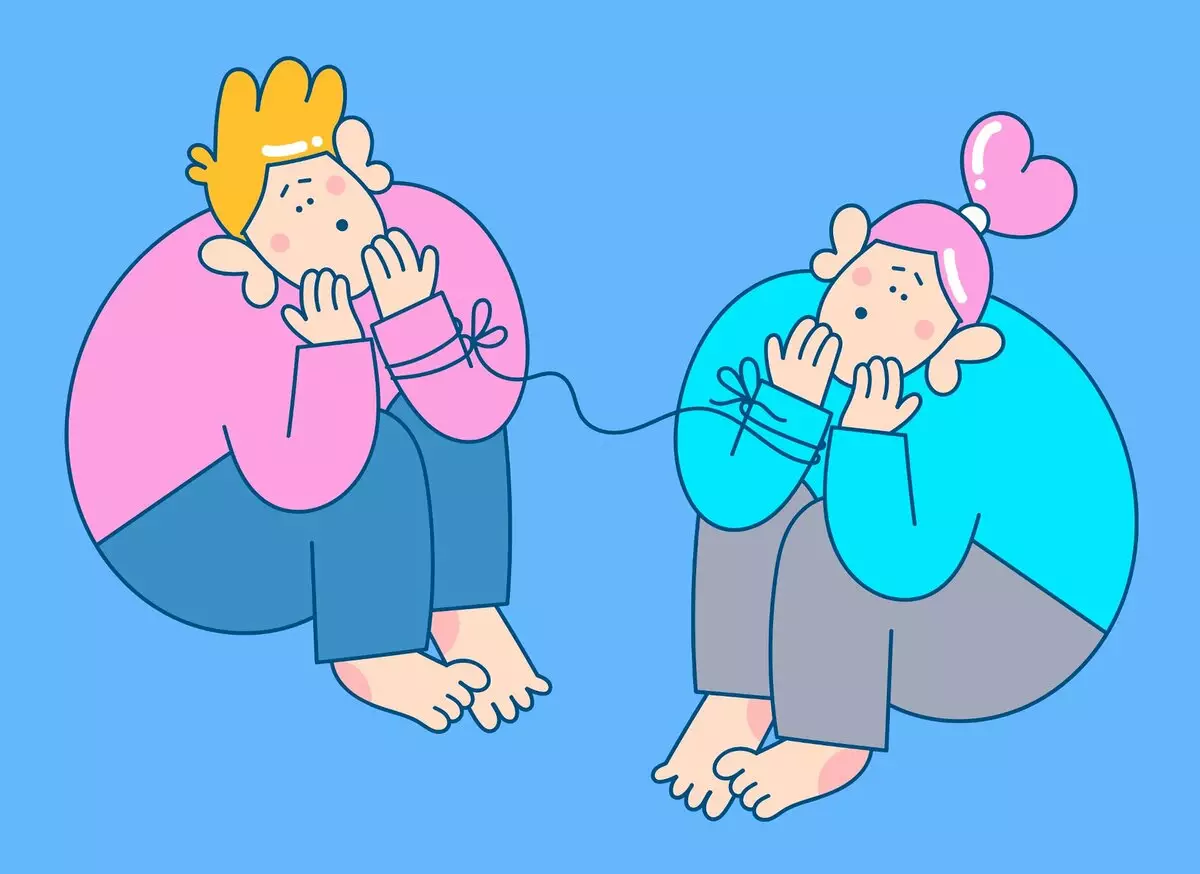
Most modern parental trends are associated with the theory of affection. However, this theory is not the only one of those that were created to explain and regulate child-parent relations. We tell what other approaches exist.
Theory of attachmentBut for starters, let's figure it out with the very theory of affection. We wrote about it more than once (for example, here and here), so now just remember the highlights.
The author of the attachment theory is considered Children's Psychiatrist John Bowlby. During the war, he worked in the London hospital, where he could watch the effect on the development and psyche of the child, the separation and loss of parents.
A little later, Bowlby began working with Canadian psychologist Mary Einsworth, and together they promoted the idea that mutual attachment arising between his mother and her child is needed to survive.
The sensitivity of the mother, her attention to the child, the ability to understand his needs and needs and satisfy them are considered key values in the theory of affection.
The low level of empathy, the inclusion and support from the mother gives the child a signal that the world around him is hostile, and he himself does not deserve love and care.Within the framework of the theory, four main types of attachments are allocated: reliable, alarming, avoiding-rejecting and alarming-avoiding. The main type of attachment, which is formed between the child and the parent, in the future affects the attitude of a child with other people, with the world and with himself.

The theory of affection has provided a strong impact on a modern approach to parent - it is her who we must be grateful for a shameless joint sleep, feeding on demand and the right to wear a child in the hands as much as we want. The popularity of attachment theory in individual European countries has even affected the increase in the duration of maternity leave and the recommended standards of children of different age in kindergarten.
Of course, it does not work out here and without criticism. The main claims of dissenters are that the formation of strong and reliable affection is very resource-intensive and requires parents of a large amount of effort and costs, with the result that they have to sacrifice personal time, desires and ambitions.
Theories of affection preceded and accompanied other approaches to parents and analysis of parental relations. Now we will tell you about them (justice I want to overeat that not all of these theories are directly related to parents - some of them relate to the development of the individual or cognitive processes, but they also affect the way you can approach the raising of children).
Naughty parenting theoriesThe flourishing of research of children's and parental relations and the formation of various systematic approaches came on the first half of the twentieth century. This does not mean that no one thought about parenthood in general - just before most theories were based on the personal experience of authors, social trends, the needs of society and religious dogmas. All the diversity of approaches and theories of parenthood, not based on scientific data, is called unscientific or folk theories.
So, for example, in the Middle Ages, the child was putting the baby to sleep were narcotic substances or alcoholic beverages, which quickly and reliably "cut out" the child.This example shows how the approach to parent has changed much during this time (if you are interested in a medieval parenthood, then we have a whole separate material on this topic).
Another indicative aspect is the relationship to physical punishments. Australian psychologists Peter Newcomb and Anthony Kish in 2015 published an article in which there were about 10 species of approaches that justify the physical punishment of children. These approaches were based on two main ideas: the fact that punishment is harmless, and that punishment is necessary and effective. Researchers call these approaches "myths", since they failed to find them any scientific justifications.
As for religious dogmas, here is a bright example of Puritian's parent approach in colonial America. They were convinced that children initially represent "evil" and "sin", and therefore the task of the parents is to "get rid of evil."
The theory of psychossexual development of FreudThe author of one of the first scientific theories of the child's development was the Austrian psychologist and psychoanalyst Sigmund Freud. In 1936, he presented the theory of psychosexual personality development, within which he allocated five main stages: oral, anal, phallic, latent and genital. As part of its theory, Freud assumed that the development of a child occurs in a strict order.
Each stage means where, according to psychoanalyst, the sexual energy of man concentrates.As a result of children's injuries or unhealthy relationships with parents, the child can begin to "lag" from its schedule of psychosexual development and fixed at a certain stage, which will lead to psychological problems in the future.
Despite the fact that among scientists there were those who supported the theory of Freud, subsequent studies showed its inconsistency, and the scientific community refused to be widely used. However, the theory of psychosexual development was still useful: she opened the doors to create and develop other scientific theories in the development of children and parental relations.
Beheviorism (behavioral theory)The classical theories of parenthood, along with the theory of affection, include behavioral theory, one of the founders of which Beheviorist John Watson became. Watson's ideas are based on the work of Pavlov (the very, with dogs) and Tordandyka. In his opinion, the child can be instilled in perfect any behavior, using the same techniques that are used, for example, when training dogs.
Watson denied the participation of internal experiences, personal preferences and self-analysis in the process of personality formation - he believed that with due money, it is possible to teach not only to behave in a certain way, but also to experience certain emotions (just like a dog can be taught to let droach when Light bulb).
The scientist considered the development of "correct" conditional reflexes to the working method of overcoming psychological problems, even such as fear or shyness.He also opposed the manifestation of excessive tenderness and care towards the child, because he was afraid that it could lead to "learned disability." In short, unlike supporters of the theory of attachment, Watson was sure that the child could be broken by "handles".
In the 1930s, the Watson's theory was supported by another scientist - the founder of radical behavior Burres Skinner. Skinner argued that with the help of external influence, not only behavior, but also thoughts and senses of man can be adjusted.
Skinner also noted that a person seeks to repeat the behavior, as a result of which he receives a remuneration, and seeks to avoid behavior, as a result of which he receives a sentence. Reinforcement can be both social (for example, praise) and material (candy or new toy), the same applies to punishment.
Social learning theoryAnother theory, or rather, another direction of behavioral theory was proposed by Albert Bandura and is called the theory of social learning. According to Bandura, previous theories focused only on some individual aspects of the formation of a person's personality (for example, only at his environment and external environment), whereas in fact it was necessary to take into account all in the complex: and the external environment, and personal factors, and internal Motivation of the person himself.
According to the theory of social learning, a person understands that some behavior is good, and some kind of behavior, based not only on its own experience, but also watching others.The child follows what is happening in the world around him, and what forms of behavior are acceptable in it, and which - no, based on this, makes your personal choice.
The theory of Bandura emphasizes the significance of not only the actions of parents aimed at forming a child of certain behavior, but also the environment in which it is growing (this is just about the fact that it is impossible to try to correct the behavior of the child if his parents show him a feed example).
German theory of "anti-recitation"Despite the fact that the theory of attachment is very popular in modern Europe, it was not always. For example, during the times of Nazi Germany, parents adhered to the theory of "anti-recreak", whose popularizer was the doctor Joanna Harer. In 1934, Haper wrote a book on the education of children "German mother and her firstborn", which contained a number of recommendations.
Harer claimed that in the first 24 hours after childbirth, the baby should be divided into the mother and put in the next room so that the mother could recover after childbirth, and the child was protected from foreign microbes. Such separation should have continued throughout the first three months of the baby's life - the mother was allowed to visit it on strict graphics to feed. Feeding should have been engaged not more than 20 minutes, and then the mother should have left the child immediately - without communication, caress and games. According to Harer, it was necessary in order to form a regime from an early age.
According to the theory of Haran, the babies were still "unindantly," and showed not enough signs of awareness and reason in the first months after delivery. According to her, crying for babies was just a way to do something.
Mothers were recommended not to take children to their hands, not to calm and do not regret them so that they did not grow up in the future in the "little, but persistent tyrants."All these recommendations were aimed at growing from children of responsible and valuable members of society - that is why children literally from the first days had to feel the majority of public over personal and learn to put their needs and desires below social interests.
All the listed theories and approaches are only a smaller part of what was developed by scientists in the last hundred years in attempts to explain what affects the formation of a person, and for which parents should pay attention to the child's education.
Classical and leading in modern Western society at the moment two theories are considered: the theory of attachment and the theory of social learning. It is them that most of all affect those solutions that parents are accepted in the process of raising children. Of course, the one and the other approach have both their strengths and their weaknesses, and therefore it is clear to say that some of the theories is most acceptable, it is impossible.
Probably, the optimal approach will be the one that parents choose, based on their capabilities, priorities, as well as from the characteristics of their child, and with a loan for scientific data (and here, separately, I want to remind you that there are no scientifically proven facts that would confirm the benefit or The safety of violence against children, but the facts proving its danger and harm - there). In addition to theories and approaches to parent, there are also different parent styles - they wrote in detail here.
Still read on the topic

